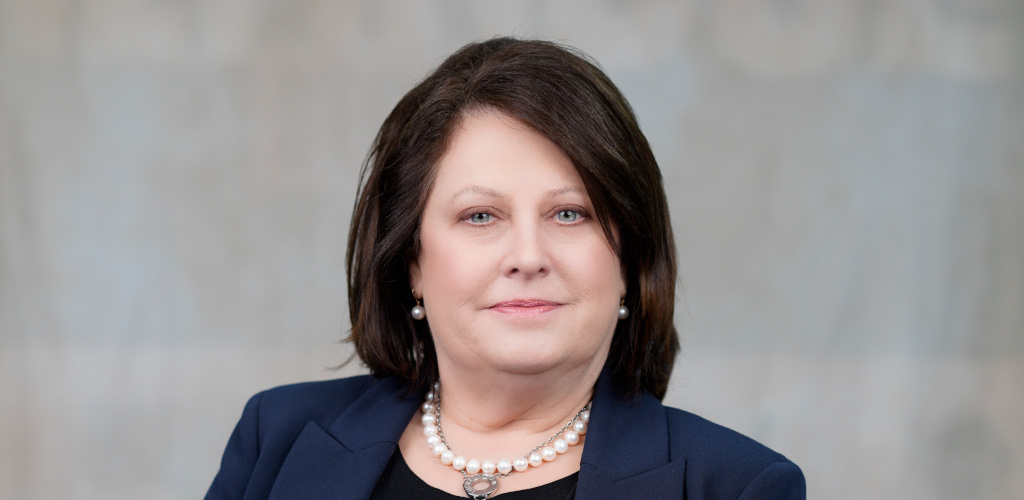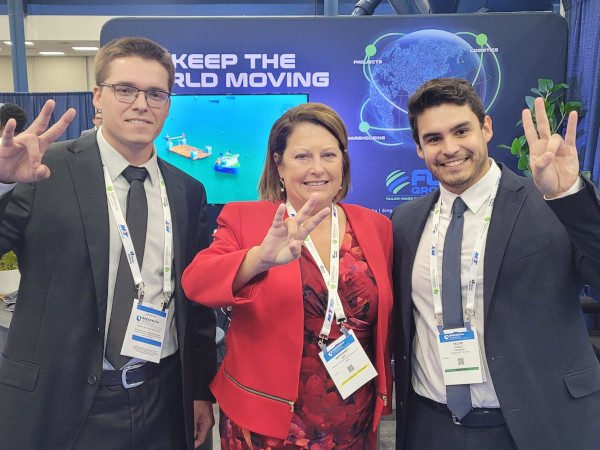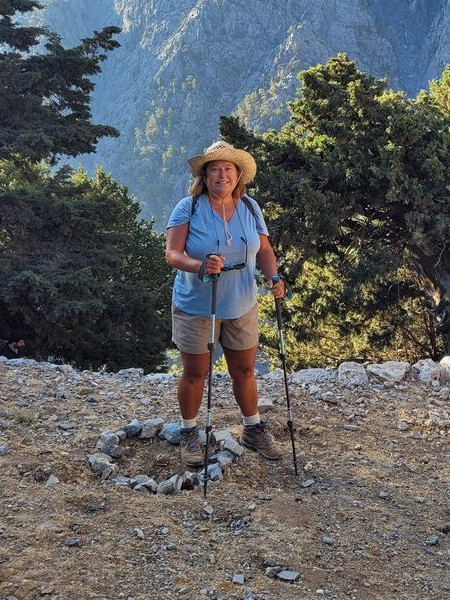Houston Stalwart Forges Academia, Industry Bonds
 By Lori Musser
By Lori Musser
Margaret Kidd, director of the University of Houston’s supply chain and logistics technology program, tells Breakbulk how her “Wall Street work ethic” has proven instrumental in her journey to becoming a globally recognized supply chain thought leader and champion for the next generation of project logistics professionals.
From Issue 2, 2024 of Breakbulk Magazine.
(6-minute read)
Behind every industry are those who pioneer, innovate, lead and push. Across the global supply chain sector, many of the individuals who become well known for effecting change are the captains of commercial and industrial enterprises. However, governments, think tanks, NGOs, public service organizations, and academia also play a critical role is producing supply chain thought leaders. Margaret A. Kidd is one.
Kidd is the director of the University of Houston’s highly acclaimed Supply Chain & Logistics Technology program as well as an instructional associate professor within the Technology Division of the Cullen College of Engineering. She has emerged on the global breakbulk and project cargo stage as a career pathing advocate extraordinaire, bringing together academia and industry to help develop the supply chain workforce of tomorrow.
She wears a plethora of hats, including a CMILT (as a chartered member of the Chartered Institute of Logistics and Transport). She is passionate about creating learning opportunities for supply chain students, and an ardent ambassador of student research competitions. Kidd’s trademark in academia is her hyper-connectivity with industry, which parlays into internships and co-ops and other partnerships, preparing students for the real world of logistics.
With her service-oriented persona, Kidd keeps a foot in numerous industry-community-university development organizations such as the Houston Maritime Centre Board of Trustees, Energy Industries Council, North & Central America Regional Advisory Board, University of Houston Community Relation Alliance, and Port Houston Partners in Maritime Education alliance. She doesn’t stop there.
The Face of Supply Chains
During the Covid era, Kidd became a de facto media darling, a well-spoken proponent of changes sorely needed during a time of global supply chain chaos. She was able to interpret the world’s transportation and logistics struggles for audiences in Texas, the U.S., and internationally, in a manner that made sense to the masses. She continues to help media outlets get to the heart of headlines ranging from Amazon earnings to the Red Sea situation to nearshoring.
“The lessons learned during Covid in terms of over dependence on manufacturing in one geography, a lack of diversification of suppliers, just-intime versus just-in-case inventories, the need for real-time visibility of cargo, the need for expanded standards for digitization and automation of processes, and an emerging new geopolitical world alignment” all impact supply chains, Kidd said to Breakbulk. “This will be reflected subtly through onshoring, nearshoring and friend shoring,” but not, Kidd added, a full-scale decoupling from Asia.
Kidd is called upon internationally to shed light on these types of current and pending supply chain issues. Whenever and wherever she speaks, she advocates for supply chain workforce development and to that end, she posits a need for structured pathways including formal management training programs, mentorships, and personal development plans. “If you look at law, banking, oil and gas, there are structured pathways for career development,” said Kidd, noting that the tradition in the sphere of breakbulk and project cargo has been to learn on the job. While that may have worked in the past, the sheer size and weight and complexity of project shipments nowadays requires new skill sets. “I think industry has got to do it,” she said.
Structuring Career Pathways
Educational institutions can provide training and manage expectations and leverage diversity – by nurturing language skills, for example – but, some of the private enterprises that make up supply chains lag in providing more structured career development and need to take action.
 “While academia theoretically levels the playing field by providing quality training regardless of gender, sexual orientation, culture group or socioeconomic status, through equitable access to university career centers and services that link to employers, we still see some industries that are behind the curve but working to play catch up.
“While academia theoretically levels the playing field by providing quality training regardless of gender, sexual orientation, culture group or socioeconomic status, through equitable access to university career centers and services that link to employers, we still see some industries that are behind the curve but working to play catch up.
"They will need to work purposely to define strategies that create equitable, inclusive and accessible opportunities for the next generation workforce. If not, they will miss the target of achieving the triple bottom line,” Kidd said.
Corporate career pathing needs to embrace a diverse workforce. It also needs to focus on Environmental, Social, Governance, or ESG.
“ESG is a good example. There is pressure from shareholders for accountability. We have the opportunity to do the right thing,” Kidd said. Just as climate change, decarbonization and carbon tracking have gained traction in government, NGO and investor mindsets, Kidd anticipates they will play an oversized role in the transportation, shipping, and port sectors.
“In the U.S., the current Biden/Harris Administration has made what is shaping up to be both a generational investment in infrastructure upgrades and the most significant climate legislation in U.S. history, offering funding, programs, and incentives to accelerate the transition to a clean energy economy through the Inflation Reduction Act of 2022,” Kidd said.
Her eye is currently on the pending Notice of Funding Opportunity from the Environmental Protection Agency for the Clean Ports Program which will be focused on grant funding opportunities for ports in non-attainment zones such as Los Angeles/Long Beach, Houston, and New York/New Jersey along with inland ports in North Texas, Utah, Colorado, and Illinois.
“Energy transition is certainly driving the nature of current and future capital projects along with the viability of the breakbulk/project cargo market to service those projects,” Kidd said. Next up, she is looking to Saudi Arabia and its wholesale transformation through the MBS Vision 2030, rampant nearshoring opportunities in Mexico, and the expanding economies of India and Southeast Asia as prime opportunity zones for capital projects.
A Circuitous Path
Kidd’s rare talent of seeing the forest through the trees may stem in part from her atypical career path. She didn’t come up through the ranks of supply chains or via an academic track. She didn’t choose either. She likes to say her career chose her.
After a successful early career with Wall St. firms, Kidd felt she had hit a glass ceiling, regrouped, and found herself studying economic development, sustainability and the port-city interface. She quickly landed her first instructional position, at Texas Southern University, and two years later was recruited as a project director for a large U.S. Department of Labor grant related to supply chain credentialing at San Jacinto College. In 2016, she joined the SCLT program at University of Houston as an instructional assistant professor and in 2018 became the program director for the SCLT.
Kidd said that the very “Darwinian” environment she faced working on Wall St., where failure was not an option, “not only defined me but assisted in the journey to becoming a globally recognized supply chain thought leader.” Skills sets developed early in her career – including an entrenched Wall Street work ethic, industry connectivity, expansive networking, the ability to adjust and adapt, a sense of resiliency, communication skills, and the ability to lead and get the most challenging jobs done – have continued to be the hallmarks of Kidd’s initiatives ever since.
Those initiatives are diverse. “I pivot all day, from engaging in academic activities focused on student success to administrative tasks necessary to keep a large academic unit running to industry engagement and community and professional service,” Kidd said.
From an academic perspective, Kidd captures the attention and creativity of students coming and going, teaching both introductory classes in logistics and capstone practicums. Lighting a fire for students in supply chain studies is a passion. “I love the impact I have been able to make on the next generation. It is very meaningful to me,” Kidd said.
Building Opportunities
Kidd wears her UH colors proudly, as an educator, but just as importantly, she has woven her research and other academic interests around her Texas base. Known to many as the energy capital of the world, the Houston area is arguably in the midst of remaking itself into the energy transition capital of the world. “While my focus is workforce and economic development in the maritime logistics space, I continue to engage in opportunities around energy transition. Climate change is real, and it is critical that we all contribute to scalable solutions for the global commons,” Kidd said.
 Some of Kidd’s recent efforts include work with the UH supply chain research team on circular plastics and leading a multidisciplinary team addressing workforce development and related educational programs for zero emission heavy-duty vehicles and cargo handling equipment, which is potentially part of a workforce development component of a large-scale EPA proposal related to energy transition.
Some of Kidd’s recent efforts include work with the UH supply chain research team on circular plastics and leading a multidisciplinary team addressing workforce development and related educational programs for zero emission heavy-duty vehicles and cargo handling equipment, which is potentially part of a workforce development component of a large-scale EPA proposal related to energy transition.
On the energy transition project, Kidd is primary investigator for a multidisciplinary team from the University of Houston. “Notably, global level change management does not happen at a community college, it respectfully occurs via executive education and research at Tier One research universities such as University of Houston.”
She is also working on an MOU with International University-Vietnam National University in Ho Chi Minh City, Vietnam. “Under this arrangement, students would complete two years in their home country and then come to the University of Houston to complete their degree in SCLT,” Kidd said.
Her interest in the Vietnam link stems partly from UH’s strong multi-cultural bent – it has one of America’s most diverse, multicultural student populations. But Vietnam has also played an ever-growing role in global manufacturing as western countries decouple from China.
And there is the Texas consumption base that has taken Vietnamese imports through the Port of Houston from 32,788 twenty-equivalent-units in 2018 to 114,684 twenty-equivalent-units in 2022.
To Kidd, the confluence of these developments spells out a need for workforce development in maritime logistics in Vietnam and the University of Houston is in a position to help.
In another project, Kidd champions global connections for student research, engaging students in the capital projects/breakbulk sector with industry stakeholders leading up to and during Education Day at Breakbulk conferences in Dubai, Rotterdam, and Houston. “This provides a safe space for students and industry to get to know each other and network,” Kidd said. It allows industry the opportunity to identify early talent already exposed to the sector. “These young people are tackling best practices and identifying solutions for challenges to industry and students get tangible/applied chances to learn about industry while completing a project for their degree plan,” Kidd said.
Higher education trains minds and is a steppingstone for the workforce of the future. Universities continue to contribute to the development of effective global supply chains and have created a pipeline of new industry entrants. Individuals like Kidd who champion the university-industry interface, lasting partnerships, research, and continuing workforce development are helping the supply chain industry secure a progressive, stronger, and more resilient future.
We caught up with Margaret at Breakbulk Middle East to talk more about the talent gap and how we can support the next generation of project professionals:
